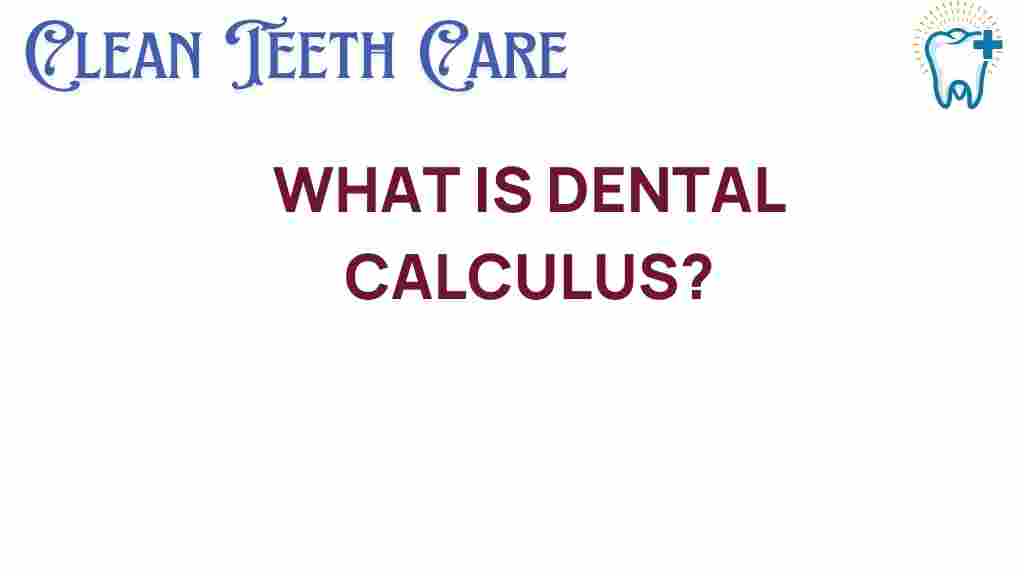Unlocking the Secrets of Dental Calculus: What You Need to Know
Understanding dental calculus is essential for maintaining optimal oral health. Many people are unaware of how plaque buildup can lead to more serious issues like gum disease if not properly managed. This article will delve into the secrets of dental calculus, its formation, effects on oral hygiene, and the preventive care needed to avoid complications. We will also cover dental treatments available for effective tartar removal.
What is Dental Calculus?
Dental calculus, commonly known as tartar, is a hardened form of plaque that forms on the teeth. It develops when plaque, a sticky film of bacteria, is not removed through regular brushing and flossing. Over time, minerals from saliva deposit into the plaque, causing it to harden and attach firmly to the teeth. This process can lead to various oral health issues.
The Importance of Oral Health
Maintaining good oral health is crucial for overall well-being. Poor oral hygiene can result in:
- Tooth decay
- Gum disease
- Bad breath
- Tooth loss
- Infections
By understanding the role of dental calculus in these conditions, you can take proactive steps to safeguard your teeth and gums.
How Does Plaque Buildup Lead to Dental Calculus?
The journey from plaque to dental calculus is a significant one. Here’s how it happens:
1. Formation of Plaque
Every time you eat, a film of bacteria forms on your teeth. This is known as plaque. If not removed, plaque can harden into calculus within 24 to 72 hours.
2. Mineralization of Plaque
Saliva contains minerals that can deposit into plaque. This process of mineralization is what transforms plaque into dental calculus.
3. Hardening Process
Once plaque hardens into calculus, it becomes much more difficult to remove. Regular brushing and flossing will not suffice, and professional dental cleaning becomes necessary.
4. Impact on Oral Hygiene
Dental calculus creates a rough surface on teeth, making it easier for more plaque to accumulate, leading to a vicious cycle of poor oral hygiene.
Consequences of Untreated Dental Calculus
Failing to address dental calculus can lead to severe consequences for your oral health:
Gum Disease
Dental calculus is a significant contributor to gum disease. When calculus accumulates, it irritates the gums, leading to inflammation and infection. The stages of gum disease include:
- Gingivitis: Early stage, characterized by swollen and bleeding gums.
- Periodontitis: Advanced stage, where the infection can lead to tooth loss.
Tooth Decay
Dental calculus can also trap food particles and bacteria, leading to increased acid production, which demineralizes tooth enamel and results in cavities.
Bad Breath
The bacteria in dental calculus can produce foul-smelling compounds, leading to persistent bad breath, also known as halitosis.
Preventive Care: How to Avoid Dental Calculus
Preventive care is your best line of defense against dental calculus. Here are some effective strategies:
1. Maintain Good Dental Hygiene
- Brush at least twice a day using fluoride toothpaste.
- Floss daily to remove plaque between teeth and below the gum line.
- Use an antibacterial mouthwash to reduce bacteria.
2. Regular Dental Check-ups
Schedule dental check-ups at least twice a year. Your dentist can perform professional cleanings that remove calculus and provide guidance on improving your oral hygiene routine.
3. A Balanced Diet
Limit sugary and acidic foods that contribute to plaque buildup. Instead, focus on a balanced diet rich in:
- Fruits and vegetables
- Whole grains
- Dairy products
4. Quit Smoking
Smoking is a significant risk factor for gum disease and can exacerbate the issues caused by dental calculus. Quitting smoking can improve your overall oral health.
Dental Treatments for Tartar Removal
If you already have dental calculus, it’s essential to seek professional help for tartar removal. Here are common dental treatments:
1. Professional Cleaning
During a dental cleaning, your dentist or hygienist will use specialized instruments to remove calculus from your teeth. This process is often referred to as scaling.
2. Root Planing
If gum disease is present, your dentist may recommend root planing, which smooths the root surfaces of teeth to help gums heal and reattach.
3. Periodontal Therapy
For more advanced gum disease, periodontal therapy may be required. This includes deep cleaning procedures and possibly surgical interventions.
4. Sealants and Fluoride Treatment
Your dentist may also apply sealants or fluoride treatments to protect your teeth from further decay and plaque buildup.
Troubleshooting Tips for Maintaining Oral Health
Here are some troubleshooting tips to keep your teeth and gums healthy:
1. Identify Problem Areas
Pay attention to areas where plaque tends to build up, such as between teeth and along the gum line. You may need to adjust your brushing technique to ensure those areas are cleaned effectively.
2. Use the Right Tools
Invest in a good quality toothbrush and toothpaste. Consider using an electric toothbrush for more effective cleaning.
3. Stay Hydrated
Drinking plenty of water can help wash away food particles and bacteria, reducing plaque buildup.
4. Educate Yourself
Stay informed about the best practices in dental hygiene and the latest advancements in dental treatments. Knowledge is your best defense!
Conclusion
In conclusion, understanding dental calculus and its implications is vital for maintaining excellent oral health. By recognizing the signs of plaque buildup and taking preventive measures, you can avoid the complications associated with gum disease and other dental issues. Regular dental visits, effective cleaning techniques, and a healthy lifestyle are essential components of effective dental hygiene. Remember, it’s always better to prevent than to treat! For more information on dental care, check out this resource.
Take charge of your oral health today, and ensure you visit your dentist for routine cleanings and check-ups!
This article is in the category Hygiene and created by CleanTeethCare Team
